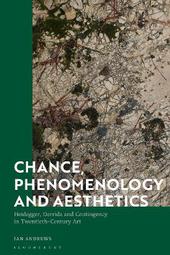
|
Chance, Phenomenology and Aesthetics: Heidegger, Derrida and Contingency in Twentieth Century Art
Paperback / softback
Main Details
| Title |
Chance, Phenomenology and Aesthetics: Heidegger, Derrida and Contingency in Twentieth Century Art
|
| Authors and Contributors |
By (author) Ian Andrews
|
| Physical Properties |
| Format:Paperback / softback | | Pages:240 | | Dimensions(mm): Height 234,Width 156 |
|
| Category/Genre | Philosophy of language
Phenomenology and Existentialism
Philosophy - aesthetics |
|---|
| ISBN/Barcode |
9781350187122
|
| Classifications | Dewey:111.85 |
|---|
| Audience | | Tertiary Education (US: College) | |
|---|
|
Publishing Details |
| Publisher |
Bloomsbury Publishing PLC
|
| Imprint |
Bloomsbury Academic
|
| Publication Date |
19 May 2022 |
| Publication Country |
United Kingdom
|
Description
In drawing upon the work of Jacques Derrida, Edmund Husserl and Martin Heidegger and aligning it with a new trend in interdisciplinary phenomenology, Ian Andrews provides a unique look at the role of chance in art and its philosophical implications. His account of how the composer John Cage and other avant-garde creatives such as Marcel Duchamp, Tristan Tzara, Sol LeWitt and Ed Ruscha used chance in their work to question the structures of experience and prompt a new engagement with these phenomena makes a truly important contribution to Continental philosophy. Chance, Phenomenology and Aesthetics will appeal to scholars and advanced students in the disciplines of phenomenology, deconstruction and hermeneutics, as well as being compelling reading for anyone interested in pursuing sound studies, art theory and art history through an interdisciplinary post-phenomenological lens.
Author Biography
Ian Andrews teaches at the University of New South Wales, Australia. He is also a media artist and theorist working with generative sound, video and text in installation formats. His areas of research interest include aesthetics, philosophy, poetry, sound, film theory, semio-linguistics and contemporary art.
ReviewsThis is a fascinating book: a rich journey into how 20th century artists incorporate chance in visual arts, texts, music, and dance. Drawing from Husserl, Heidegger, and Derrida, Ian Andrews illuminates how chance operations work as a discipline of non-intention that frees possibilities of change and self-transformation. * Daniela Vallega-Neu, Professor of Philosophy, University of Oregon, USA * How do we form an aesthetic that allows the things of this world to show themselves in all their chance and fleeting unexpectedness? No other recent study of phenomenological aesthetics offers such an eloquent and informative defence of the random in art and its powers of exposure. * Nicholas Davey, Professor Emeritus of Art and Philosophy, University of Dundee, UK *
|